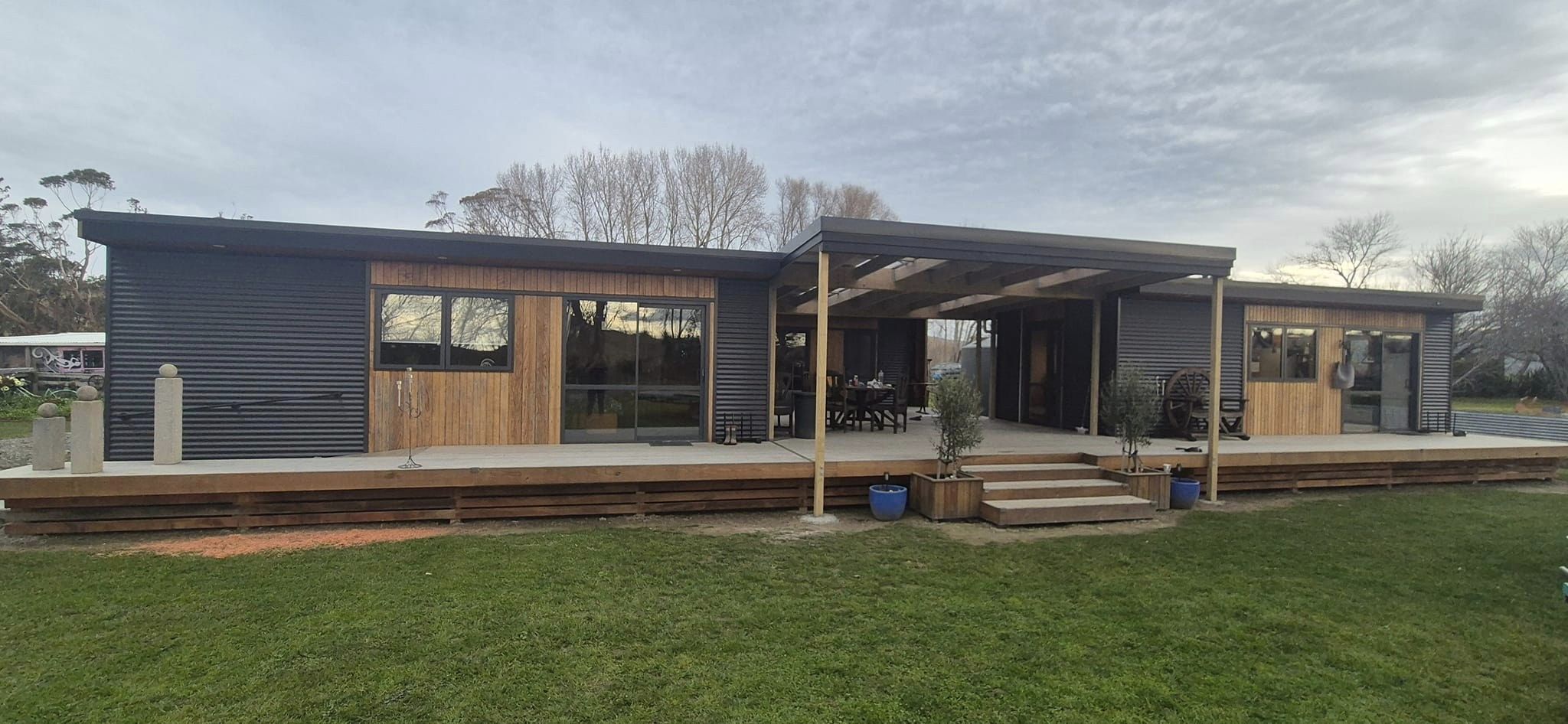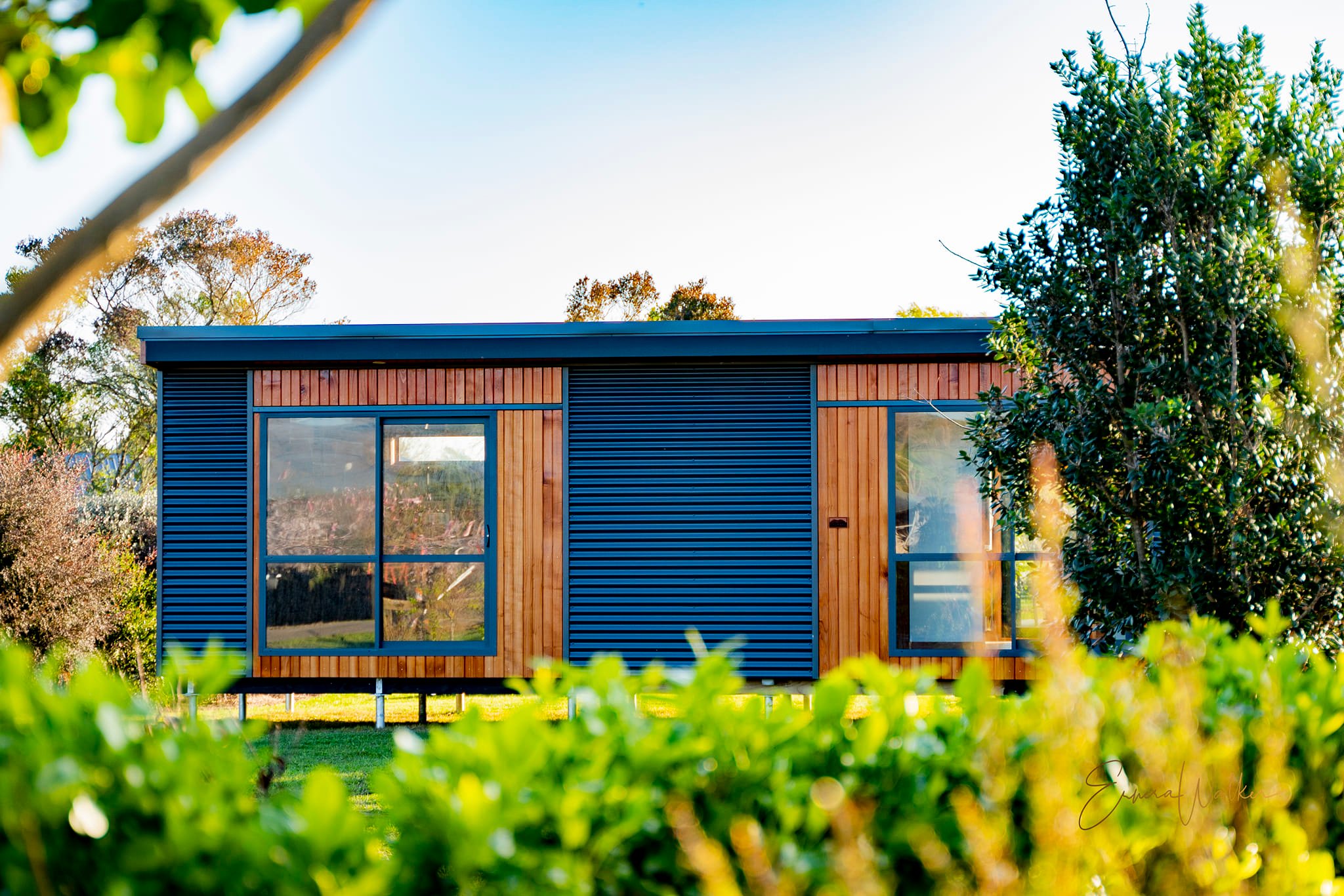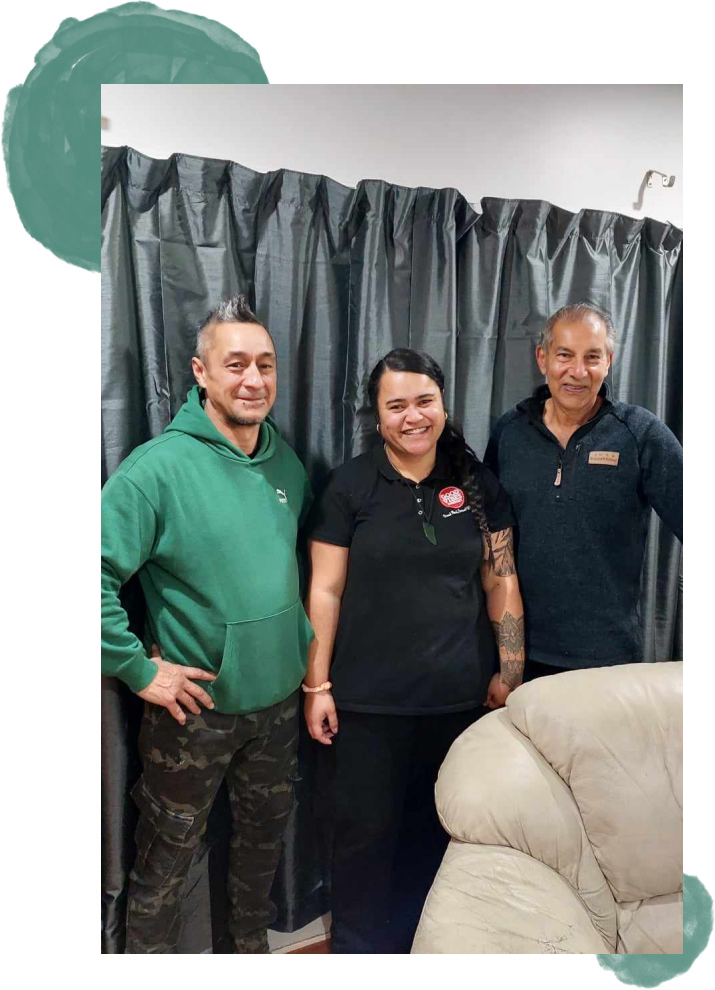The need for warm, dry, affordable homes and transitional housing is at an all-time high. In response, many of the organisations we at TTF support are forging new paths towards housing security and stability for whānau in the heart of their communities.
Hikurangi Enterprises based on the East Coast is one of those, having established a scalable housing model that combines traditional Māori values with modern sustainable practices to help more Māori into their own homes. Established in 2016 as a social enterprise to drive economic development and employment in the Waiapu valley of Te Tairāwhiti, it has developed a Progressive Home Ownership programme (PHO) in the wider region.
The programme, Kaenga Hou (Whare Ora), is dedicated to offering a healthy, eco-friendly, affordable and accessible housing solution to whānau in Te Tairāwhiti. It aims to uplift whānau and strengthen the social fabric of the community. The programme is funded by grants and investment by TTF and Trust Tairāwhiti, along with lending from Community Finance and the Ministry of Housing and Urban Development. Following a successful launch, the PHO programme has the potential to be replicated in other regions and deliver much-needed warm, dry and affordable homes for whānau. So far, Whare Ora has built 80 whare for whānau in Te Tairawhiti since 2021.
“Not only are we helping our whānau into their own homes, which helps restore pride and mana in our communities, but it creates stability for tamariki too,” says Panapa Ehau, Hikurangi Enterprises’ executive director. “We’re also developing a ‘rent-to-own’ programme in partnership with Community Finance and Money Sweetspot, which helps support low-income whānau and those building on Māori-owned land. It’s about providing a complete package to help our whānau into owning their own homes in Te Tairāwhiti,”
Housing solutions from north to south
In Te Tai Tokerau (Northland), Te Pae Roa is doing its bit to address poor-quality housing in the region. Both housing statistics and what they have seen and heard in their communities demonstrate that a large percentage of whānau Māori are living in damp and mouldy homes. With the help of philanthropic investment partners TTF and Foundation North, and Crown funding through Te Puni Kōkiri and the Energy Efficiency Conservation Authority, the Te Pū Maioro kaupapa has helped to repair 100 whare across the rohe.
With a focus on creating warmer, drier homes, the mahi included repairing or replacing over 43 roofs, recladding on 54 houses and spouting on 46 homes, as well as providing many other repairs including installing new windows, LED lights, ventilation fans and hot water cylinders. This mahi makes the homes not only warmer but also more energy efficient, with cost savings for whānau. It has also contributed over $2.7 million to the local building and construction industry.
Te Pū Maioro’s unique stacking-model approach combines funding from multiple Investment partners to create a greater pool of repairs pūtea. That allows repairs to go further than one funder could achieve on their own, and ensures whānau priorities can be heard and actioned. This creates better outcomes for whānau and contributes to both specific and broader outcomes for its funders.

Also in Northland, the Waitangi National Trust’s innovative, solutions-focused thinking created the Waitangi Housing Expo ‘Roadmap to my Home’ during this year’s Waitangi Day celebrations. The trust saw the opportunity to address housing challenges by bringing all components of the system together in one place to tackle the issues. “The purpose was to bring everyone together to build relationships and partner on real solutions that address our housing challenges,” explains Ben Dalton, Waitangi National Trust’s chief executive officer.
This initiative approach brought together existing and planned Māori-housing models, providing the community with an opportunity to understand solution options, consenting processes and funding or financing options. The trust also wanted to enable interconnectivity across the industry — enabling collaboration that otherwise might not occur. And importantly, they wanted to showcase the potential for Waitangi to host shared kōrero on topics of strategic importance to the Crown–Māori relationship.
They achieved all that and more: Waitangi weekend 2024 was one of the largest events in years, with an estimated 80,000 people attending over the three days. The housing expo was a huge success, with 84% of expo attendees who were surveyed saying they had made new and useful connections. This is just the beginning.
At the opposite end of Aotearoa another successful housing initiative is taking a different approach and achieving impressive results. In the South Otago town of Kaitangata, a group of community-minded locals found their own solutions to attract new families to the area, help boost their local economy and address a skills shortage. Local residents pioneered their community-led approach to housing by forming the Kaitangata Housing Trust — pooling resources and expertise to build affordable homes, tailored to the needs of families.
Building six homes supported by grassroots funding initiatives attracted a much-needed workforce to the community. TTF provided support with a loan facility and Kaitangata Housing Trust became a successful model for sustainable, community-driven development that also can be upscaled. Once the Clutha District Council could see the initial success of the programme, it came on board and built houses alongside the trust. The combined team has completed 12 houses in the last three years and attracted 12 families to live and work in a now-thriving Kaitangata.
Because other families have seen this progress in the town, residents started building their own new homes and this has added an additional nine homes to the town. While the trust is handing back its loan to TTF, the Clutha District Council has agreed to continue constructing two homes each year, with the trust finding prospective owners and supervising the builds.
“The Kaitangata Housing Trust members would like to thank The Tindall Foundation so much for believing in our project and for being prepared to support us financially. Your belief in our trust has led to a revival in our town and for this we are eternally grateful,” says trustee Joyce Beck.

Building a path to home ownership
Debt and financial insecurity are major barriers to home ownership for many Kiwis. Growing the opportunities to connect housing providers with community-minded financial networks is proving to be a lifeline for whānau facing economic hardship or struggling to buy their own homes.
Money Sweetspot is one such adviser that provides debt consolidation loans to help families take charge of their financial lives, reduce debts and get on with living. Since launching in December 2022 Money Sweetspot has spoken with over 3,000 families juggling over $60 million of debt, and has provided financial-reset loans of nearly $14 million to just under 600 families. This creates breathing space and a pathway out of debt that includes financial education, incentives, rewards and a focus on positive impact over profit. TTF has recently supported Money Sweetspot with a further $5 million loan facility to help a further 500 families out of financial hardship.
“We see, too often, unmanageable debt becoming a defining moment in someone’s life,” says Sasha Lockley, co-founder and CEO of Money Sweetspot. “Living in a constant financial juggle makes it hard to dream or achieve home ownership.
“Our financial reset, which includes incentives for engaging with financial education as a key part of the pathway, means that families can take charge of their debt, increase their knowledge and create the pathway of their own choosing. For many this is one of the first steps towards owning a home of their own.”
Community Finance is another financial organisation in which TTF has invested, both as a shareholder and also in its community bond programme. An impact investment specialist, Community Finance makes the connection between wholesale impact investors and investments that deliver social outcomes. It does this primarily by providing lower-cost finance to New Zealand’s leading community housing providers (CHPs) so that they can scale up and provide additional social housing for those in need.
Its finance model enables investors, philanthropists and foundations to select a meaningful and ethical way to help develop thriving, diverse and inclusive communities. Last year alone, Community Finance raised some $65 million, which supported charities including the Salvation Army, Emerge Aotearoa, Penina Trust and CORT Community Housing.
Across Aotearoa, the impact of these initiatives is profound. Thanks to these organisations, families who may have struggled with overcrowded rentals or faced the daunting prospect of never owning a home now have opportunities and renewed hope. The benefits are immeasurable. This type of mahi enables children and rangatahi to grow up in stable environments, surrounded by supportive communities that value their wellbeing and future. It’s not just about the house: it’s about creating a stable foundation for future generations to thrive.

Homes for the homeless
Providing a safe, warm place to live doesn’t look the same for everyone, though. For some rangatahi facing homelessness and financial instability, this can be a confronting reality. The mahi that Mā Te Huruhuru Charitable Trust is doing offers a lifeline for marginalised rangatahi, aiming to provide stability and support.
The trust offers an urban papakāinga youth-housing programme, the first of its kind to support homeless taitamariki in South Auckland. It offers 24/7 wrap-around support services to young, homeless Māori for a period of one to two years. The focus is on providing housing stability and work-readiness skills, and strengthening cultural identity throughout this period, preparing these rangatahi for independence. Their innovative programme creates a home environment and fosters a sense of belonging and resilience. For the first time, many rangatahi are able to discover not just a home, but a community that is willing to embrace them with open arms. Through mentorship programmes and social initiatives, rangatahi are empowered to begin the journey towards rebuilding their lives.
Kootuitui ki Papakura is warming things up in South Auckland. They have scaled up their warm, dry homes model and so far have insulated 168 homes in Papakura, working to educate their community about how to stay warm and healthy throughout the winter. Their team also undertakes minor home repairs and supplies families with new blankets and pyjamas. The aim of their programme is to increase house temperatures by 6°C during winter so that children can be protected from contracting preventable diseases that may lead to hospital admissions and are caused by cold, damp, mouldy and inadequate housing. So far 336 adults and 772 children have benefited and are now warmer, drier and healthier.
“These are only a handful of examples that are representative of the thousands of whānau and rangatahi being supported towards better outcomes thanks to the mahi these organisations are doing. The impact ripples far beyond housing statistics, though. Their work forms a connected system of organisations helping communities grow stronger, and they are pillars of hope and resilience for families, proving that when communities unite, transformative change is possible,” says John McCarthy, TTF’s manager.
Looking ahead, the journey towards affordable and accessible housing in Aotearoa continues to evolve. Challenges will always remain, but with each new home built, with each whānau and rangatahi supported, the ground is laid for a more equitable future. The solutions lie in helping to unlock the power of communities to shape their own destinies. As a result of these organisations’ perseverance, collaboration and systemic approach to their work, more whānau are living in warm, dry, affordable houses, and are now able to create homes — places where memories are made, futures are forged and the spirit of community thrives.


